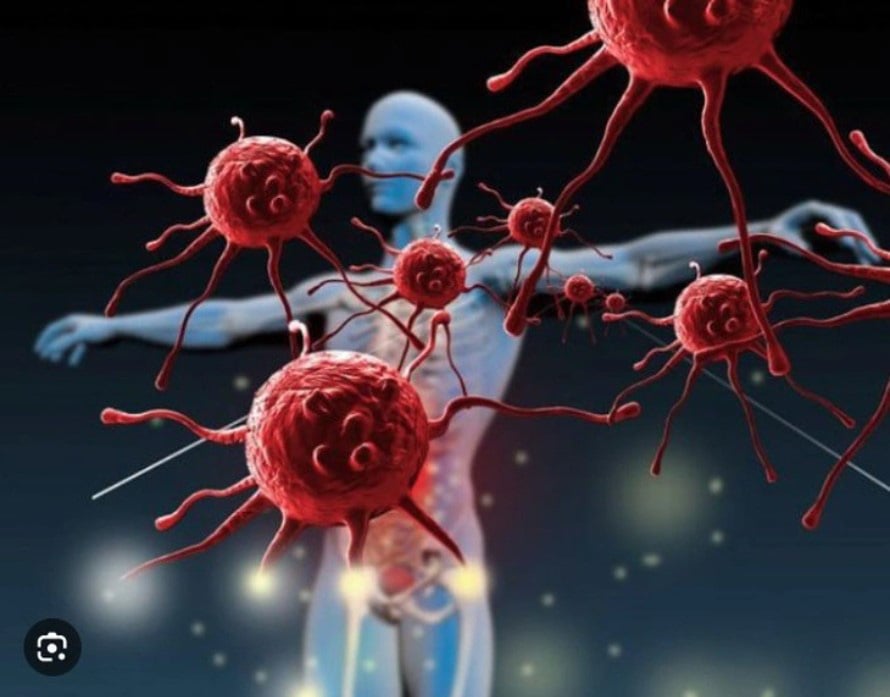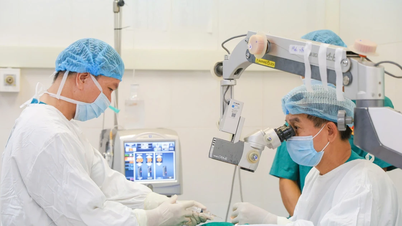Cancer is the second leading cause of death in the world. In the early stages, when the tumor is still localized in one location, there is a greater chance of treatment. Therefore, recognizing the early warning signs of cancer is extremely important.

Cancer patients go for check-up at Ho Chi Minh City Oncology Hospital - Illustration photo
Early warning signs
Doctor Nguyen Thi Thuy, Department of Chemotherapy, 108 Central Military Hospital said that unlike benign tumors that grow very slowly in place and have a surrounding shell, malignant tumors (cancer) invade surrounding healthy tissues like a "crab" shape, with crab claws clinging to healthy tissues in the body.
With advances in medicine today, many types of cancer have been treated. However, early cancer symptoms are often vague or absent, causing many patients to miss the best treatment time. Recognizing the early warning signs of cancer is very important.
According to Dr. Nguyen Van Thai, Military Institute of Radiation Medicine and Oncology, if there are signs of cancer in the body, there are usually 3 characteristics while sleeping, but many people are subjective.
- Prolonged night fever: When you have cancer, your resistance gradually decreases, especially at night. This leads to persistent fevers that cannot be cured even with medication.
Most cancer patients will have fever in the evening and at night. But it is important to remember that not all cancer patients have fever, and not all cancer patients who have fever at night have cancer.
Symptoms of cancer generally do not appear alone, but will be accompanied by other abnormalities such as pain, fatigue, weight loss, and loss of appetite.
- Insomnia: Insomnia can be a single disease or it can also be a symptom of many diseases including cancer. Many studies have shown that cancer and sleep disorders are closely related. Most cancers cause sleep disorders to some extent.
The characteristic of insomnia due to cancer is that it often causes repeated awakenings in the middle of the night or early morning. Especially once awake, the body will always be restless, it is very difficult to fall asleep again and almost no relief by taking conventional medicine.
- Pain: Cancer causes pain, difficulty breathing, chest tightness, coughing and nerve compression at night, causing difficulty sleeping and insomnia.
Especially cancers related to the liver, kidney, stomach, and brain can easily cause waking up in the middle of the night or around 3-4 am. Growing tumors affect the detoxification process, sending signals and causing waking up at night.
Among the types of nocturnal pain caused by cancer, bone pain is the most common. According to studies, about 70 - 80% of cancer patients will have bone metastases, leading to bone pain. They usually occur in the spine, followed by the ribs, pelvis, thigh bones and leg bones.
In addition, the development of cancer can also cause some other less common nighttime sleep abnormalities such as excessive sweating, severe abdominal pain, chest tightness, shortness of breath, persistent cough, convulsions, cramps in the limbs, headaches, frequent urination at night, etc.

Cancer attacks every part of the body - Illustration photo
Early signs vary depending on the type of cancer.
Dr. Thuy emphasized that each type of cancer will have a different set of symptoms. Some symptoms develop early in the cancer process, but symptoms such as weight loss or fever often only appear after the tumor has progressed. Some types of cancer, such as pancreatic cancer, may have no symptoms in the early stages. But you should pay attention to the following situations:
- Weight loss : Unexplained weight loss can be caused by other health conditions such as hyperthyroidism, depression, or digestive problems. But the difference is that cancer often causes sudden weight loss. According to the American Cancer Society (ACS), many people lose 10 pounds or more before being diagnosed with cancer.
Weight loss is most common in cancers of the esophagus, lung, pancreas, stomach... Cancer also changes metabolism causing loss of appetite and feeling less hungry.
- Unusual bleeding : Some cancers can cause bleeding. For example, colorectal cancer can cause bloody stools; kidney or bladder cancer can cause blood in the urine. Sometimes blood loss can be harder to detect if it is internal bleeding, such as with stomach cancer.
- Persistent cough or hoarseness : Coughing is a reaction of the body when infected with viruses, allergies or dust. But a persistent cough can be a sign of lung cancer, along with other signs such as coughing up blood, chest pain, weight loss, fatigue and shortness of breath. A persistent cough is also sometimes a symptom of thyroid cancer.
- Skin changes : Skin changes are often associated with skin cancer and are sometimes a sign of other types of cancer. For example, white spots in the mouth can be a sign of oral cancer; yellowing of the skin and eyes is a sign of liver cancer.
Cancer can cause changes in the skin such as: Increased pigmentation or dark spots; Moles on the skin that grow larger, possibly larger than a pencil eraser; Moles that are inconsistent in color, both black and brown; Moles that are asymmetrical or have jagged edges; Skin ulcers that do not go away or that heal but come back; Jaundice.
- Changes in the breast : The appearance of a lump in the breast is a typical symptom of breast cancer, but not all lumps are cancerous, they can be cysts or benign tumors.
If you notice any changes or new growths in your breasts, including a palpable lump; swollen, red, scaly, or rough skin; pain; a lump under the armpit; nipple discharge or bleeding... see your doctor immediately.
- Abnormal digestive function : Some cancers can lead to digestive problems, such as difficulty swallowing, changes in appetite, or pain after eating.
Difficulty swallowing or a feeling of food getting stuck in the throat that lasts more than two weeks can be a sign of cancer of the nasopharynx, lung or esophagus.
Gastrointestinal cancers (stomach, duodenum, colon, rectum) can cause symptoms such as indigestion, nausea, vomiting, and bloating. These symptoms are often confused with common digestive problems. Ovarian cancer can also cause bloating; while brain cancer causes nausea and vomiting.
Some cancers develop silently, without any symptoms or warning signs until they reach an advanced stage. In some cases, lung cancer does not cause a cough, but only a few unnoticeable signs.
Early-stage kidney cancer often causes no symptoms. As the tumor gets larger or progresses, symptoms such as pain on one side, blood in the urine, or fatigue may occur.
When there is one of these unusual signs, regular health check-ups and cancer screening are the best way to detect and treat it early.
Source: https://tuoitre.vn/dau-hieu-khi-ngu-canh-bao-mam-mong-ung-thu-20241215095518339.htm





![[Photo] General Secretary To Lam arrives in Minsk, begins state visit to Belarus](https://vphoto.vietnam.vn/thumb/1200x675/vietnam/resource/IMAGE/2025/5/11/76602f587468437f8b5b7104495f444d)

![[Photo] General Secretary To Lam concludes visit to Russia, departs for Belarus](https://vphoto.vietnam.vn/thumb/1200x675/vietnam/resource/IMAGE/2025/5/11/0acf1081a95e4b1d9886c67fdafd95ed)

























![[Photo] General Secretary To Lam meets and expresses gratitude to Vietnam's Belarusian friends](https://vphoto.vietnam.vn/thumb/1200x675/vietnam/resource/IMAGE/2025/5/11/c515ee2054c54a87aa8a7cb520f2fa6e)
![[Photo] National Assembly Chairman Tran Thanh Man attends the Party Congress of the Committee for Culture and Social Affairs](https://vphoto.vietnam.vn/thumb/1200x675/vietnam/resource/IMAGE/2025/5/11/f5ed02beb9404bca998a08b34ef255a6)



























































Comment (0)